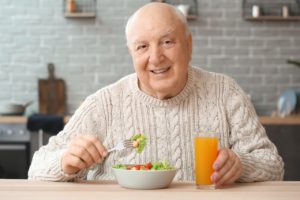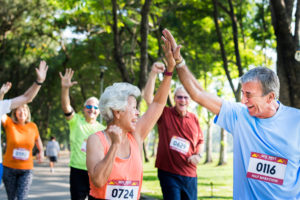The third age is increasing in Brazil, according to the Population Projection, a survey carried out by the IBGE, in 20 years more than a quarter of Brazilian citizens will be over 60 years old. Also according to this study, much of this is due to the better living conditions of the elderly population, being a prerequisite for the maintenance of daily activities and for healthy aging.
In other words, health in the elderly is fundamental, not only for the prevention of diseases, but to provide a happier and more active life, which contributes to the well-being of the elderly population. In today’s blog, you will learn about some health care in the elderly and you will know how to prevent typical diseases of aging.
1- Follow a healthy diet:
Quality of life is directly linked to healthy eating. It is not today that a balanced diet is recommended for all people who want to improve their health. At the best age, it is essential as it is responsible for the control of several chronic diseases, reduction of heart and vascular problems, among other benefits.
It is recommended to reduce the consumption of salt, sugar, trans fats and processed foods, putting more fruits and vegetables in daily meals. Due to the gradual loss of nutrients, the elderly should also be open to the consumption of supplements, which can help to complement the meals.
2- Drink water:
The elderly should drink more water, precisely because the concentration of body fluids in the elderly is lower. Dehydration is harmful to all organs, especially the brain, causing confusion, forgetfulness and contributing to worsening memory problems.
Fluid intake is essential for the maintenance of the urinary tract in the elderly. At this stage of life, clinically simple situations, such as a urinary tract infection or kidney stone, may present complications due to the patient’s age. The recommendation is to drink 2 liters of water a day. However, the amount may vary, depending on the weight and routine of each one.
3- Be active!
Physical exercises are essential for promoting a better quality of life. For the elderly, this practice becomes even more important, not only for the prevention of diseases, but for the maintenance of the active body. One of the most frequent changes during aging is the loss of skeletal muscle mass, another problem related to aging is the loss of bone mineral mass, which affects men and women, from the age of 45.
For these and other reasons, the practice of physical exercises is essential and manages to reduce this loss of muscles and bone nutrients, reducing the impacts of aging and loss of body mobility. In addition, physical exercises in old age include many benefits, such as:
– Prevention of cardiovascular problems;
– Aid in the control of chronic and cardiac diseases;
– Muscle and bone density strengthening;
– Greater independence in functional activities.
It is worth mentioning that physical exercises also contribute to reducing depression and anxiety, which are frequent in the elderly. To make the practice even more pleasurable, specialists in physical education indicate the participation of special groups for the elderly with a focus on physical activities, such as yoga, pilates, swimming, etc.
4- Sleep well!
Sleeping well has several advantages for the body and mind, as it helps to reduce irritability and helps to minimize the effects of memory deficit and the development of cardiovascular diseases. In old age, the recommendation is six to eight hours and sleep, but this can vary according to the body’s needs.
More important than the number of hours, the quality of sleep is the fundamental factor for ensuring well-being in old age. If you’re not sleeping well, don’t accept it as “something of age”, look for a sleep health specialist.
5- Have medical follow-up
Medical follow-up is recommended for all ages, health check-ups too, however, for the elderly, it becomes essential. Therefore, the elderly should always keep in touch with their doctors, take preventive exams and adopt a healthy lifestyle.
The most common specialists in the elderly are: geriatrician, cardiologist, urologist, physiotherapist and dentist.
During medical follow-up, it is possible to diagnose a number of diseases early and guide the appropriate treatment as soon as possible, however, during this process, some care must also be taken, one of them is the use of adequate PPE to prevent patient and professional from being exposed. to diseases.
Thus, the use of gloves is essential for this procedure to be carried out safely, increasing the quality and life expectancy of the elderly. Learn more about medical gloves on our website!



